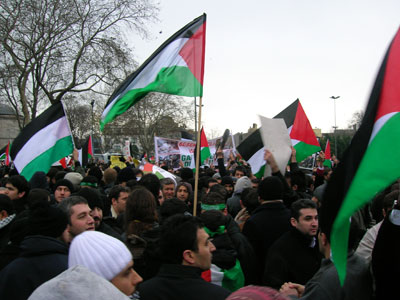
Public Outrage Against Israeli Policies in Gaza Could Turn into Anti-Semitic Sentiment
Publication: Eurasia Daily Monitor Volume: 6 Issue: 3
By:

As Prime Minister Recep Tayyip Erdogan increases his criticism of the Israeli offensive in the Gaza strip, the Turkish people are continuing to demonstrate against Israeli policies toward Palestinians. This time, the substance and size of the rallies are much different from previous anti-Israel rallies in Turkey. In the past, anti-Israel rallies were organized in Istanbul and Ankara; this time NGO’s in almost all Turkish cities are organizing demonstrations to oppose the Gaza attack. On January 3 anti-Israel rallies were held in the following Anatolian cities: Samsun, Ordu, Sinop, Corum, Diyarbakir, Canakkale, Sakarya, Van, Agri, Urfa, Mus, Yalova, and Izmir. The sizes of the rallies varied from as few as 100 participants to as many as 10,000 (Radikal, January 3). The biggest demonstration was held in Istanbul by the Islamist Saadet Party with 20,000 people participating, according to the police (Radikal, January 4). There were also small gatherings in other parts of Istanbul and in Ankara.
Despite the fact that the biggest rally was organized by an Islamist party, other segments of Turkish society were by no means silent. From the leftist labor union Confederation of Public Employees Trade Unions (KESK) to the Kurdish nationalist Democratic Society Party (DTP) almost all segments of Turkish society supported the anti-Israel demonstrations (Radikal, January 3; Cihan Haber Ajansi, December 29). In addition to Islamists who formed Solidarity Committees for Palestinians, leftist intellectuals and organizations have formed their own Palestinian Solidarity Committees to organize continuous protests against Israeli policies. The Union of Chambers of Turkish Engineers and Architects (TMMB), the Confederation of Public Employees Trade Unions’ Branch Federation (KESK), the Ankara branch of the Confederation of Revolutionary Trade Unions of Turkey (DISK), Public Houses, the Ankara branch of the Human Rights Association (IHD), the Revolutionary 78s Federation, the Democratic Rights Federation, the Socialist Democracy Party, the Turkish Communist Party, the Liberty and Solidarity Party, and other leftist organizations issued a statement not only criticizing Israeli government polices but also the ruling Justice and Development Party (AKP) for not taking effective measures against the Israeli government (www.sol.org.tr, December 12).
The protests in Turkey even went so far as to interrupt an international basketball game. A game in Ankara between Turkish Turk Telekom and Israeli Bnei Hasharon had to be canceled when protesting basketball fans threw their shoes at the Israeli players (Yeni Safak, January 7)
The Turkish media’s outrage toward Israeli policies is no different from that of the public. From the Kemalist Cumhuriyet to the Islamist Vakit, Turkish newspapers have stressed the fact that the Israeli offensive has victimized children. On December 29 Cumhuriyet printed a headline saying “Israel targeted children who were going to their homes” (Cumhuriyet, December 29). A headline in the Center-Right Hurriyet referred to a “rocket massacre” and the paper wrote that “Israel targeted a mosque, which outraged the world” (Hurriyet, December 28, and January 4). A Vakit headline read, “Israel going mad” (January 4); and the liberal Taraf published a Palestinian baby’s photograph with the headline “He will be killed as well” (Taraf, January 6).
There has not been a single day without photos in the Turkish press of Palestinian children killed in the Israeli offensive. Turkish internet portals went so far as to hold opinion polls about whether the Turkish military should go to Gaza to establish peace there. It was no surprise when 89 percent of the 54,452 respondents supported the idea of sending Turkish troops to Gaza (www.haber7.com). The Turkish government did not close the door on the idea of dispatching Turkish troops as part of a UN monitoring agreement. The cabinet spokesman, Deputy Prime Minister Cemil Cicek, said that “if it will contribute to bringing peace to Palestine, Turkey might consider sending Turkish troops to Gaza” (www.haberturk.com, January 5).
Three interrelated factors are behind the public outrage toward Israeli policies in Gaza. First and foremost are the unexpected number of civilian casualties as a result of the unbalanced Israeli offensive to stop Hamas’s rocket fire into Israel and the intensive and disturbing media coverage of the war. Even the head of the Turkish Jewish community, Chief Rabbi Isak Haleva, issued a statement underlining his concern about civilian casualties: “I am deeply sorrowed about the conflict in our region. The civilian casualties of the war drag me and my community into deep sorrow” (Cihan Haber Ajansi, January 6).
Second, the West’s approval of the Israeli offensive has deeply disappointed the Turkish people, because they have recently witnessed two examples of how the West has reacted differently in similar crises. First, the West responded relatively quickly and properly against Russian aggression toward Georgia and stopped the Russian attack. Even Erdogan asked why the West did not respond to Israel as it had to Russia (www.stargazete.com, January 4). In addition, when the Turkish military conducted a cross-border operation into northern Iraq against the Kurdistan Worker’s Party (PKK) last February, Western countries, including the United States, quickly warned Turkey to end the operation as soon as possible. Thus, the Turkish public does not accept the West’s arguments, which put the entire blame for the current crisis on Hamas.
The third reason for the public outrage is the fact that, in addition to other political parties and the NGOs, the AKP government is also loudly expostulating against the Israeli military actions in Gaza. Erdogan said, “I am telling [Israeli Defense Minister] Ehud Barak and [Foreign Affairs Minister Tzipora] Livni to forget about the elections, because history will judge them for the black stain they are leaving on humanity" (Hurriyet Daily News, January 7).
The intensity of the anti-Israel sentiment in Turkey might have far-ranging implications in Turkish-Israeli relations. If it increases, it could turn into anti-Semitic anger toward Turkish Jews. So far, the government has not taken any steps to prevent the wave of anti-Israel sentiment from turning into anti-Semitism.




